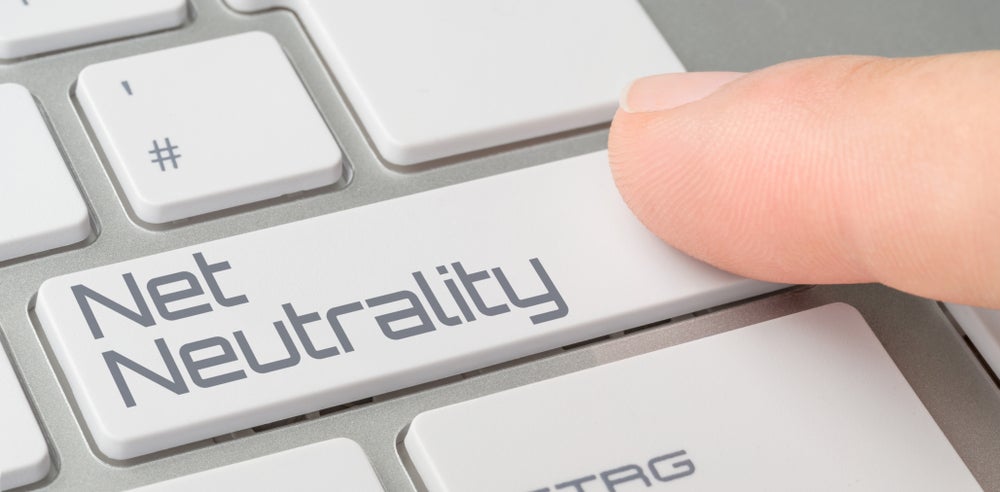
Net neutrality refers to the concept that internet service providers (ISPs) should be neutral gateways to the internet rather than gatekeepers with the power to decide what content is available or what speeds that content is transmitted at. Under net neutrality rules, ISPs would not be able to block or throttle any internet content or provide a two-tier internet with fast lane access for those content providers who pay for priority access. So what is net neutrality in business and why is it important?
Supporters of net neutrality argue that an “open Internet” is essential in order to encourage innovation and free speech. Opponents of net neutrality argue that it discourages ISPs from investing in the high-speed broadband networks that the West badly needs if it is to stay ahead in the global “data revolution”.
Net neutrality, where rules prohibit content blocking and throttling based on content and paid priority access, has officially been repealed in the US. ISPs and wireless companies will no longer be regulated like utilities, but the issue is far from settled. The US Senate has attempted to stop the repeal but must get backing from the rest of Congress and President Trump, which is unlikely to happen. States are now looking to pass their own net neutrality rules, and the Trump administration is aiming to block those attempts, arguing that the Internet is an interstate service. Meanwhile, Europe, Canada, and India are strengthening their net neutrality laws, determined not to go the way of the US.
With the majority of US voters wanting something to be done, Congress will take up the issue again, and may see its hand forced as states attempt to enact their own laws. Broadband providers say they welcome Congressional action, as long as it has to do with consumer protections and not extra regulations for them. For wireless carriers, 5G brings an opportunity to enable different levels of service to different customer sets. Carriers want to be able to deliver services with varying speeds and quality of service for applications such as self-driving cars, connected devices, and video.
What does net neutrality mean for business?
Supporters of net neutrality, including companies such as Apple, Google and Netflix, argue that an “open Internet” is essential to encourage innovation and free speech.
Opponents of net neutrality, such as Verizon and Vodafone, argue that if telecom operators are not allowed to charge commercial rates to Internet companies for use of their networks, they may have little incentive to invest in the high-speed broadband networks that the West badly needs.
When the concept of net neutrality first rose to prominence as a regulatory policy guideline back in 2004, the FCC had a “higher purpose” in mind: to support a high growth, innovative Internet sector for the US and to promote American values of freedom and openness around the world.
The policy worked.
Today, the Internet is free, open and innovative. It is also highly profitable. Indeed, Internet companies like Apple, Google and Facebook, who benefited most from net neutrality, are now worth more than most telecom operators.
But net neutrality created a market distortion: US Internet service providers were made to subsidise the US Internet sector. Europe’s telecom regulators and many Asian regulators followed the principles of net neutrality that originated in the US. These countries also forced their ISPs to subsidise their Internet sector, which is comprised mainly of US Internet companies.
This market distortion created an unintended side effect: the US and European telecom operators cut back on investment in high-speed broadband networks because, under existing net neutrality rules, it simply did not make commercial sense. There were too many free-riders. As a result, the US and Europe have been falling rapidly down the world league of broadband speeds.
As a regulatory policy, net neutrality is now unsustainable. This is because any economy that wishes to benefit from the “data revolution” needs to invest in high-speed broadband infrastructure. Yet net neutrality provides a disincentive for ISPs to invest in high-speed broadband infrastructure because they are prohibited from maximising the returns on their investment.
Internet traffic is growing so fast that the quality of service for many Internet users is suffering as networks get clogged up. The problem is particularly acute on mobile networks. When a resource is scarce, the only way to bring supply and demand into equilibrium is to price that resource accordingly. Yet Internet bandwidth is effectively free for most Internet companies like Netflix, Facebook or Google so there is no commercial imperative to use it efficiently.
In the East, governments dictate the amount of capital expenditure in broadband networks. In the West, market forces dictate the level of investment. So, the West risks falling behind in the “data revolution” because of the dilemma posed by net neutrality: the need for investment in broadband infrastructure is urgent, yet the financial incentives to build high speed Internet networks are declining.
As this funding crisis in telecom infrastructure has worsened, the Internet has become more political. Regulators and politicians all around the world – who are miffed that investment in broadband infrastructure is not taking place at the rate that their economies require, are now trying desperately to come up with an acceptable fix.
What are the main themes around net neutrality?
Software defined networks
SDN is a new architecture for telecom networks in which the emphasis shifts from hardware to software. It will be hugely disruptive because it fundamentally changes who controls the telecom network. Yet it has been slow to take off, primarily because of cybersecurity concerns but also because of net neutrality implications.
SDN’s open hardware standards threaten to commoditize networking hardware, which is still largely based on proprietary systems, making it easier for Internet companies to program data networks.
Internet regulation
Growing public concern over widespread abuse taking place on Internet platforms – including revenge porn, fake news, political interference, and promotion of terrorism – is forcing regulators to police the Internet better.
In 2019, regulators will continue to clamp down on big tech companies in a number of key areas – data privacy, data protection, anti-trust, tax avoidance, legal status as a content platform, net neutrality, anti-social behaviour, obstruction of justice, copyright, and corporate governance.
Splinternet
The splinternet refers to the fragmentation of the Internet due to factors such as censorship, geopolitics, cybercrime, nationalism, and privacy. Political regimes and regulators with growing concerns about fake news, national security, and online safety are beginning to target the leading social networks, not least because many of them do not pay their fair share of taxes.
The theme of regulation will be a significant one for social media companies in 2019. Authorities will be targeting them across a number of areas, including data privacy, data protection, anti-trust, tax avoidance, net neutrality, antisocial behaviour, copyright, and their legal status as content providers, and any legislation resulting from this has the potential to fundamentally reshape the landscape of the Internet. Calls for the large Internet companies to be broken up will also intensify, although this is unlikely to happen in the short-term.
Brexit
As Brexit stumbles towards a currently uncertain trade deal with the EU, businesses everywhere are attempting to second-guess the longer-term fallout in trade relationships and currency swing terms. For social media companies with offices and business relationships in the UK, Brexit also brings new uncertainties and potentially new challenges in future net neutrality and data privacy protection regulation.
Digital regulation reformation is unlikely to be a first priority for a post-Brexit UK government, and the shorter-term impact on social media platforms is likely to be around currency and UK advertising customer demand sensitivity. Social media companies have no choice but to wait and see how friendly a post-Brexit UK regulator will be towards the social media industry.
5G
The hype around 5G has been building for so long now that it can be easy to forget that it will not become widely commercially available until 2019 at the earliest. Even then, uptake will be minimal – just 0.09% of all mobile data traffic will be carried over 5G by the end of next year. 5G’s positioning as a revolutionary technology that will enable fundamental shifts in how we live and work has served to raise expectations to such a level that the only possible outcome is disappointment.
Telcos in China, Japan, South Korea, and the US are expected to lead the rollout of 5G networks, with Europe and India following some way behind. This is due to a number of geographic conditions, such as mobile market fragmentation in the EU, lower LTE penetration (the 4G mobile communications standard), and more restrictive regulations, including net neutrality and site acquisition processes.
Codecs
With net neutrality scrapped, this could lead to Internet companies like Facebook and Google being charged in proportion to the Internet bandwidth they consume, then the technology sector is likely to invest heavily in codecs.
A codec is a device or program that compresses data, such as video, to enable faster transmission through a telecom pipe and then decompresses it when it has reached its destination, so the end user can see the full richness of the data.
New codecs may be developed which compress video and other data more efficiently so that they consume less Internet bandwidth on transmission.
What is the history of net neutrality?
The Internet was first brought into the regulatory remit in the US with The Telecommunications Act of 1996. The Federal Communications Commission, America’s telecom regulator, has stated that the goal of this law was to let anyone enter any communications business, thereby encouraging the growth of the Internet.
In 2003, a law professor by the name of Tim Wu coined the term, “net neutrality” to represent the idea that Internet service providers (ISPs) should treat all Internet traffic equally. It meant that ISPs could not block, throttle or discriminate against Internet services they did not like. The theory was that big companies like Google should not be allowed to pay ISPs like AT&T or Comcast to get into an Internet “fast lane” to have their website work better than other websites that were not paying.
Whilst the FCC quickly adopted the concept of net neutrality, the FCC’s authority to regulate ISPs was soon called into question by the courts.
In 2005, the US Supreme Court decided that cable Internet service providers like Comcast were “information services” and could not, therefore, be regulated by the FCC, which had jurisdiction over “telecommunication services”.
In that same year, as if to labour the point, Ed Whitacre, AT&T’s then CEO, said, “Why should they be allowed to use my pipes?” referring to Internet companies like Google. “The Internet can’t be free in that sense, because we and the cable companies have made an investment and for a Google or Yahoo or Vonage or anybody to expect to use these pipes free is nuts.”
In 2007, Comcast was accused by one of its customers – Robb Topolski – of actively interfering with his attempts to share his music files online using BitTorrent, a peer-to-peer Internet file sharing service that was particularly efficient for large files sizes. This ran counter to the tradition of treating all types of Internet traffic equally.
In 2008, the FCC ruled against Comcast for blocking BitTorrent traffic and ordered Comcast to clarify its traffic prioritisation practices to customers and to stop discriminating against BitTorrent traffic.
In 2010, the FCC passed the Open Internet Order, which formally introduced net neutrality rules. The order called for all ISPs to treat Internet traffic equally. This meant the ISPs had to disclose their traffic management policies to their customers. It also meant they were prohibited from blocking traffic or discriminating against lawful websites. The order applied only to fixed-line networks because mobile networks had limited bandwidth and thus had to prioritise traffic to avoid cellular blackouts.
In January 2014, Verizon challenged the FCC’s authority to enforce net neutrality rules. The U.S. Court of Appeals for the D.C. Circuit ruled that the FCC did not have the legal authority to enforce net neutrality rules over ISPs, because they were regulated only as “information services” under Title I of the Communications Act. But the court ruling also implied that the FCC could easily regulate all ISPs by reclassifying the ISPs under Title II, which treated them as common carriers.
In February 2015, a new Open Internet Order was approved by the FCC which reclassified ISPs as “telecommunication service providers” under Title II of the Communications Act. This new Open Internet Order prohibited ISPs from blocking or throttling legal content. It also banned so-called “Internet fast lanes” whereby Internet companies like Netflix could pay ISPs like AT&T for preferential treatment in their pipes. The new Open Internet Order was passed under the leadership of Tom Wheeler, a Democrat, appointed by President Obama and passed by just 3 votes to 2. Ajit Pai, a Republican member of the FCC, voted against the Chairman.
In January 2017, Ajit Pai, a former Verizon lawyer, was appointed Chairman of the FCC by President Trump. Chairman Pai has always vehemently argued against net neutrality.
On 14 December 2017, the FCC voted on whether to remove net neutrality rules altogether by reclassifying broadband providers from Title II “common carriers” to Title I “information services”.
This article was produced in association with GlobalData Thematic research. More details here about how to access in-depth reports and detailed thematic scorecard rankings.







